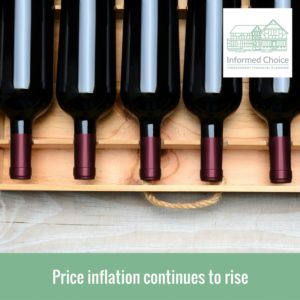 Price inflation continues to rise last month, according to the latest set of official figures.
Price inflation continues to rise last month, according to the latest set of official figures.
The Consumer Prices Index (CPI) measure of price inflation rose from 0.5% to 0.6%.
This inflation was pushed higher by rising fuel prices, more expensive alcoholic drinks and hotel rooms.
The Office for National Statistics (ONS) also reported an increase in the Retail Prices Index (RPI) measure of price inflation, which rose to 1.9% in July from 1.6% in June.
July’s RPI inflation rate is important because it sets the limit for rises in regulated rail fares in England, Scotland and Wales next year.
Commenting on the latest inflation figures, Anna Stupnytska, Global Economist at Fidelity International, said:
“UK inflation should continue heading higher in the coming months, as the weak pound pushes up the cost of imports further.
“The extent of sterling depreciation seen thus far, around 18% in trade-weighted term since the end of 2015, could boost inflation by more than 1%, with the peak likely to occur in 2017.
“As the Bank of England announced in August, they are intending to look through higher inflation overshooting the target of 2% and keep monetary policy loose to help the economy navigate through the Brexit-related uncertainty.
“For savers, this results in a ‘double whammy’, as rising inflation and falling yields eat away their savings. For consumers, rising inflation will lead to higher spending on everyday items including food.
“This reflects further bad news for the UK economy, with NIESR estimating a 0.2% month-on-month contraction in GDP for July (around 2% annualised).
“While this remains only an estimate for now, we begin to get the first hard data on the economy later this week, with the release of the unemployment report on Wednesday and retail sales on Thursday.
“I expect the hard data to start picking up the collapse in confidence survey in the aftermath of the referendum, at least to some extent.
“With the Brexit negotiations likely to last for some time, the related drag on growth will weigh on the economy over the next few months, despite the easy monetary policy and a potential fiscal boost likely to be announced in the Autumn budget.”
The price inflation figures published today are the first to have been collected since the EU referendum result.
Commenting on the figures earlier today, Aviva pointed out that it would be premature to reach any conclusions about the impact of the result on prices.
They did however note that the price of alcohol rose by 0.5% between June and July 2016 compared to a fall of 2.5% between the same two months last year.
This was primarily due to a rise in the price of wine which will have been impacted by the recent fall in the price of sterling.
Aviva pointed out that the headline CPI inflation figure of 0.6% is an average, but shopping habits differ by age.
Their analysis of typical shopping habits of different age groups and the price movements of different services and goods unveils a very different experience for different age groups.
The analysis found that the under 30s are experiencing above average price inflation – nearly three times the level experienced by those aged 75+.
They noted that in areas where the young spend more of their money – e.g. education and hotels – prices are rising.
In areas where the young spend less of their money – e.g. food and non-alcoholic drinks – prices are falling.
Commenting on the analysis, Alistair McQueen Savings & Retirement manager said:
“Across all ages, inflation has not been at current levels for over a year. The under-30s, in particular, are facing a double-whammy. Prices are rising faster in areas where they spend more, and rising slower, or falling, in areas where they spend less. These underlying differences are often hidden when we plan our finances.
“Price movements are outside anyone’s direct control, but this does not mean we are powerless to act.
“There are two actions we can take to manage the impact of inflation. Firstly, careful and constant budgeting helps us manage the impacts of price movements. A simple understanding of money coming in and money going out will help defend us against “hidden” price movements.
“Secondly, making any savings work harder to counter the effects of inflation makes good financial sense. An individual savings account (ISA) and a pension, with their positive tax advantages, would be a good place for many savers to begin.”

